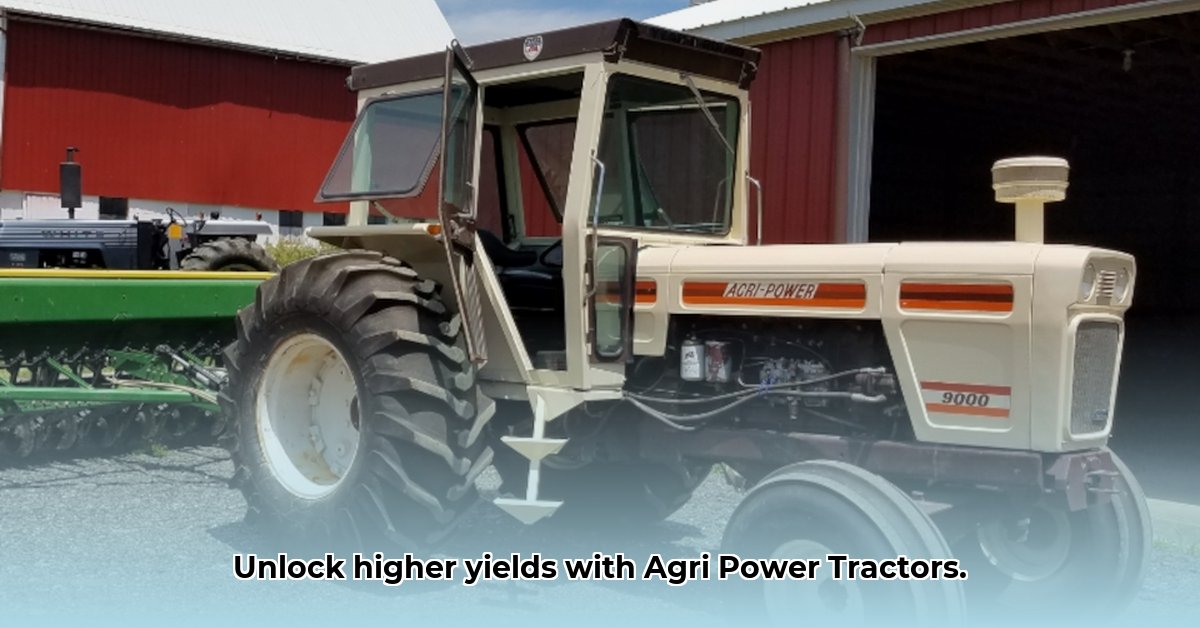
The agricultural landscape is undergoing a dramatic transformation. Gone are the days when sheer horsepower dictated farming success. Today, sustainability and technological innovation are driving a shift towards more efficient and environmentally friendly practices. This evolution is particularly visible in the evolution of farm machinery, epitomized by the rise and fall of companies like Agri-Power and the ascent of modern solutions like those offered by H&R Agri-Power. Let's explore how this shift is reshaping the future of farming. For budget-conscious farmers, exploring affordable options is key; check out inexpensive tractors.
The Rise and Fall (and Rebirth) of Agri-Power: A Case Study
Agri-Power, once a prominent name in agricultural equipment, serves as a stark illustration of the challenges facing smaller manufacturers in a rapidly evolving industry. Outcompeted by larger corporations with greater resources for research, development, and distribution, Agri-Power's decline highlights the imperative for adaptation and innovation. Their struggles, however, underscore a larger, more significant story: the shift towards sustainable farming practices and the adoption of technological advancements. While Agri-Power may have faltered, its legacy inadvertently paved the way for a renewed focus on smarter, more sustainable farming. It's a story that mirrors the broader industry transition.
H&R Agri-Power: A Modern Approach to Farming
H&R Agri-Power represents the modern approach to agricultural equipment sales and service. They're not just selling tractors; they're offering a comprehensive solution, an integrated system that empowers farmers with the tools and support needed to thrive. This holistic approach encompasses not only the machinery but also expert maintenance, readily available parts, accessible financing, and assistance in implementing precision agriculture technologies. Their strategy underscores a crucial element of success in today's farming: a complete support system geared towards maximizing output while minimizing environmental impact. This comprehensive approach makes it easier for farmers to transition to more sustainable methods.
Precision Farming: Technology's Role in Sustainable Productivity
Precision agriculture is revolutionizing farming. It's a move away from blanket application of inputs to targeted, data-driven approaches. GPS-guided tractors, sensors, and advanced data analytics provide farmers with unprecedented control over their operations. Imagine applying fertilizer only where needed, avoiding waste and minimizing environmental damage. This precision approach minimizes fertilizer runoff into waterways, reduces pesticide impact on beneficial insects, and optimizes water usage through targeted irrigation. The result? Lower environmental impact and significantly higher yields. Modern tractors, equipped with precision farming technologies, are at the heart of this revolution. Isn't this a more efficient and effective way to farm?
Sustainable Practices and Technological Advancements: A Synergistic Relationship
Sustainable farming is no longer a choice; it's a necessity. Modern agricultural machinery plays a pivotal role in achieving these goals. How do modern tractors, like those offered by H&R Agri-Power, contribute?
- Reduced Emissions: Modern, fuel-efficient engines significantly lower greenhouse gas emissions compared to older models, reducing a farm's carbon footprint.
- Optimized Resource Use: Precision agriculture minimizes waste by precisely targeting input application, conserving water, fertilizers, and pesticides.
- Improved Soil Health: Optimized tillage practices and data-driven soil management improve long-term land health and crop resilience.
These improvements are not only environmentally beneficial but also economically advantageous.
Challenges and Opportunities: Navigating the Transition
The transition to sustainable farming presents significant challenges. High upfront costs for new technologies can be a major hurdle for many farmers, especially smaller operations. This requires a multi-faceted approach to support farmers in this transition. Dealers need to adapt their services, manufacturers must continue innovating, and policymakers must create a supportive regulatory environment. Addressing these challenges requires collaborative effort and investment.
Actionable Steps: A Collaborative Approach to a Sustainable Future
The transition to sustainable agriculture necessitates a collaborative effort from all stakeholders. Here's how each group can contribute:
- Farmers: Explore financing options, participate in precision agriculture training, and embrace data-driven decision-making.
- Dealers: Offer precision agriculture training, expand service offerings, and establish strategic partnerships.
- Manufacturers: Develop more fuel-efficient and sustainable equipment, invest in research and development, and prioritize sustainable materials.
- Policymakers: Provide financial incentives, invest in agricultural research, and implement supportive regulations.
This coordinated effort is essential to ensuring a successful transition. What proactive steps will you take?
The Future of Farming: Sustainable and Thriving
The future of agriculture depends on embracing technology and sustainable practices. Modern tractors are not simply machines; they are vital tools for creating a sustainable, productive, and profitable agricultural sector. The transition from legacy methods to data-driven, environmentally conscious approaches is paramount for ensuring global food security and preserving our planet. The Agri-Power story, though one of challenge, also stands as a powerful testament to the potential of adaptation and the bright future of sustainable farming. The time for change is now.